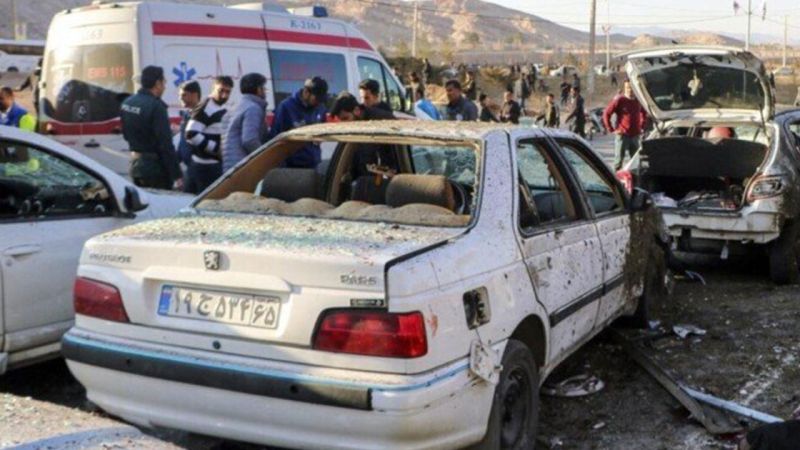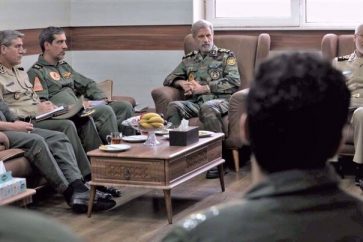Iran has strongly denounced the attack by Pakistan on the southeastern Iranian province of Sistan and Baluchestan, leading to the summoning of the Pakistani chargé d’affaires by the Iranian authorities to register a formal protest.
The Pakistani diplomat was called to the Iranian Ministry of Foreign Affairs on Thursday in the absence of the country’s ambassador to Tehran.
The purpose was to seek an explanation regarding a series of explosions in various areas near the city of Saravan in Sistan and Baluchestan province, situated close to the border with Pakistan earlier in the day.
Nasser Kan’ani, the spokesman for the Iranian Foreign Ministry, subsequently expressed strong condemnation of the attack. He confirmed that the Pakistani chargé d’affaires had been summoned by the ministry to convey Tehran’s protest to Islamabad and demand a comprehensive explanation about the nature and motives behind the attack.
4 Children, 3 Women Killed
Iranian Interior Minister, Ahmed Vahidi, revealed a devastating toll on Thursday morning as a result of the explosion. The casualties included 4 children, 3 women, and 2 foreigners.
Simultaneously, Pakistan declared carrying out military strikes against what it labeled as “terrorist hideouts” in the Iranian province, terming it “Marg Bar Sarmachar.”
Pakistani President, Arif Alvi, emphasized the fraternal bond between Pakistan and Iran, asserting that disputes should be resolved through dialogue and mutual consultation. Alvi lauded the Pakistani army’s actions against alleged terrorist hideouts in Sistan and Baluchestan, emphasizing the commitment to national security and territorial integrity.

Alvi underscored that tackling terrorism is a global challenge, requiring collective efforts, while reiterating Pakistan’s respect for the sovereignty and territorial integrity of all nations. The Ministry of Foreign Affairs echoed this sentiment, stating that Pakistan’s actions aimed at safeguarding national security, emphasizing the singular goal of protecting its people. Pakistani Armed Forces announced through a post on the “X” platform that “7 targets were attacked at 3 points in Iran – Saravan, Shamsar, and Hanaq – targeting terrorist headquarters.”
The Assistant to the Sistan and Baluchestan Province for Security and Police Affairs, Ali Reza Merhamti, provided details on the attack, revealing that Iranian border villages were bombed by Pakistan in the early hours of Thursday morning.
This development follows Tehran’s prior missile and drone strikes on two bases of the Jaish Al-Adl (Army of Justice) armed group in Pakistan. The bases were specifically targeted and successfully demolished late on Tuesday in the Koh-e-Sabz area of the province, which is known to be among the main bastions of Jaish al-Adl terrorists.
Jaish al-Adl is a notorious terrorist group with headquarters in Pakistan, and has been involved in numerous terror attacks against Iran.
Diplomacy
Iranian Foreign Minister Hossein Amir Abdollahian conveyed a crucial message to his Pakistani counterpart, Jalil Abbas Gilani, in a Wednesday evening phone call. Abdollahian underscored that “Pakistan’s security is equivalent to Iran’s security,” emphasizing the threat posed by the “Army of Justice,” a terrorist group targeting the shared security of both nations.
During their conversation, the two ministers discussed the latest developments in bilateral relations. Amir Abdollahian expressed satisfaction with the existing friendly relations between Iran and Pakistan, highlighting the importance of continuous cooperation and close communication across various fields.

Reaffirming Iran’s commitment to respecting Pakistan’s sovereignty and territorial integrity as a friendly neighbor, Amir Abdollahian clarified that the recent anti-terrorism operation by the Iranian Armed Forces targeted the mentioned terrorist group without causing harm to any Pakistani citizens.
Amir Abdollahian stressed the significance of ongoing dialogue, consensus, and cooperation between Tehran and Islamabad on various issues, including addressing the challenges posed by terrorist groups. He expressed optimism about the continued exchange of views leading to enhanced relations and stronger security cooperation.
In response, Pakistani Foreign Minister Gilani acknowledged the common goals and the historical commitment of Iran and Pakistan in defending each other and combating terrorism. Gilani emphasized that “Iran’s security is that of Pakistan’s security,” pledging that Islamabad takes necessary measures whenever there is a threat originating from Pakistani territory against Iran.
Martyrdom of a IRGC Colonel in Sistan and Baluchestan
It is noteworthy that Tehran’s targeting of two headquarters of the so-called “Army of Justice” in Pakistani territory comes at a time when the Al-Quds headquarters of the Iranian Revolutionary Guard in Sistan and Baluchestan reported the martyrdom of Colonel Hussein Ali Javadanfar.
The IRGC Ground Force’s Quds Base said in a statement on Wednesday that Colonel Javdanfar, a serviceman at IRGC’s Salman unit in the province, was killed in a targeted shooting attack on the road linking Khash city to the provincial capital city of Zahedan.
The statement described Javdanfar as an IRGC advisor, who had traveled to Saravan County on a mission to oversee cultural activities and projects there.
Pakistani Muslim Unity Council Calls for Diplomatic Resolution
The official spokesman for the “Muslim Unity Council” party in Pakistan expressed concern about the rapidly escalating tension between the two Islamic nations. The party emphasized the need for respecting sovereign borders and urged handling border issues with wisdom and insight. The Council called for an immediate diplomatic solution to the current crisis, warning of its potential negative impact on regional security and stability.
The party pointed out external interference by the United States and ‘Israel’, leading to provocation of disputes between the two Islamic countries. Emphasizing the importance of solidarity among Islamic nations to confront common challenges, the Council called for unity in the face of global threats.
Source: Al-Manar




